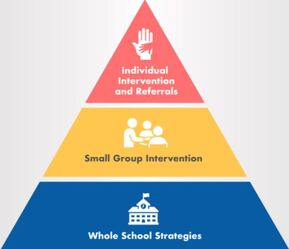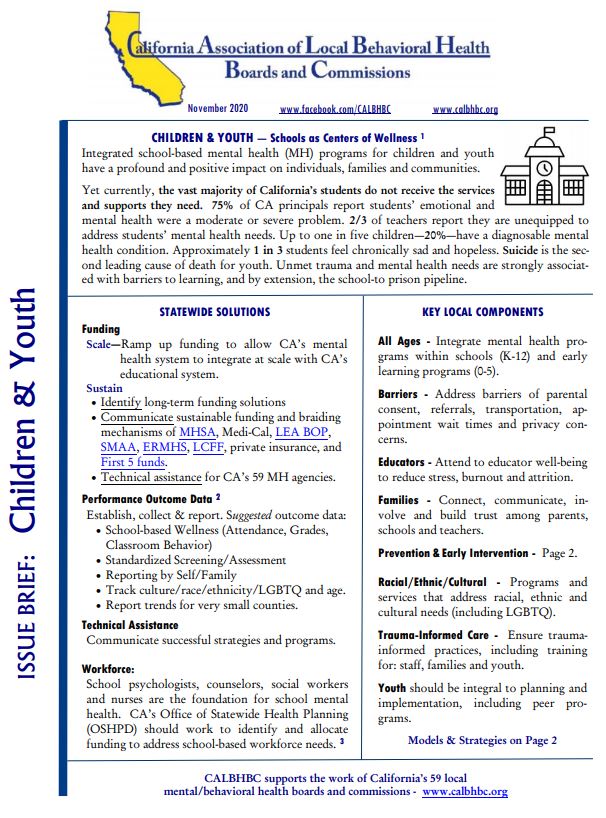Children's Behavioral Health |
Also see webpages: Foster Children & Youth and Youth 16 - 25
|
Legislation/PolicyCYBHI: CA Children and Youth Behavioral Health Initiative (CYBHI)
AB-2246 Pupil suicide prevention policy requirement public schools grades 7 - 12. Related 2020 Auditor's Report AB-403 Implementation Requirements to Establish a Family Urgent Response System for Foster Caregivers and Children or Youth AB-2083 Foster youth: trauma-informed system of care - Requirements for local communication and collaboration, including "Memos of Understanding" (MOU) between local agencies. AB 403 - Implementation Requirements for trauma-informed core services and training for short-term residential therapeutic programs and Foster Family Agencies AB 114: EDUCATIONALLY-RELATED MH SERVICES (ERMHS) Assembly Bill (AB) 114 changed the process by which students in Special Education receive mental health services. Previously, under AB 3632, county mental health departments provided services. However, realignment under AB 114 requires all California school districts to be solely responsible for ensuring that students with disabilities, as designated by their Individualized Educational Plan (IEP), receive the mental health services necessary to benefit from a special education program. Students with IEPs who demonstrate behavioral health issues that impact their ability to learn and access the school curriculum are eligible for AB 114. Services must be included in the IEP and can include: individual counseling, parent counseling, social work services, psychological services, and residential treatment. Any service agreed upon by the student’s IEP team as necessary for the student to receive a free and appropriate public education may be considered a related service and covered by AB 114 funds. There are three primary ways districts are meeting the AB 114 requirement:
Funding Process: Funding is distributed from the California Department of Education directly to Special Education Local Plan Areas (SELPAs) based on the average daily attendance of all pupils in the SELPA (regardless of how many pupils have an IEP or disability). SELPAs then determine how to allocate dollars to the individual districts and schools. Additional Information: Assembly Bill 114 Special Education Transition: Click to learn more. |
Resources/Reports Best practices in student mental health starting with whole school strategies, then small group intervention, and finally individual intervention and referrals. Best practices in student mental health starting with whole school strategies, then small group intervention, and finally individual intervention and referrals.
Evidence Based & Community-Defined Evidence Practices Grants - California has awarded $30.5 million to 63 groups supporting youth mental health through community and evidence-based practices, supporting parents, grandparents, and other family caregivers. The evidence-based practice and community-defined evidence practice models funded include Positive Parenting Practices, Incredible Years, Healthy Steps (Medi-Cal Dyadic Services Benefit), Parent Child Interaction Therapy, Effective Black Parenting Program, Positive Indian Parenting, and more. 2023
Youth at the Center: Calls-To-Action for a Reimagined Behavioral Health Ecosystem from Children, Youth, and Families Across California, CA Health & Human Services, 2023 Working Paper: California’s Children & Youth Behavioral Health Ecosystem, an early blueprint articulating what a more integrated and equitable mental and behavioral health system would look like and outlining the components, changes and steps necessary to get there, CA HHS Behavioral Health Task Force, 2023 Children and Youth Behavioral Health Initiative January 2023 Progress Report, CA HHS Behavioral Health Task Force National Guidelines for Child and Youth Behavioral Health Crisis Care, SAMHSA, 2022 Children & Youth Behavioral Health Initiative, DHCS, 2022 L.A. County Multidisciplinary Assessment Team Process Report, CA Institute for Behavioral Health Solutions, 2022 “Addressing infant and early childhood mental health needs: opportunities for community solutions,” The Children's Partnership and the First 5 Center for Children's Policy California Healthy Minds, Thriving Kids Project: Includes a series of free, evidence-based video and print resources that caregivers and educators can use to teach their kids critical mental health and coping skills. In English and Spanish, they are tailored for elementary, middle, and high school students. New mental health curriculum law goes into effect in California, SM Daily Journal, 2022 COVID-19 and Children’s Mental Health: Addressing the Impact, 2021 Little Hoover Commission School Mental Health 101: A Primer for Medi-Cal Managed Care Plans, National Center for Youth Law & CA Children’s Trust, 2021 Mental Health Integration through an Interconnected Systems Framework (ISF), midwestpbis2.org Protecting Youth Mental Health, U.S. Surgeon General, 2021 Students & Trauma, A Culture of Compassion, CA Teacher's Association, October 15, 2019 California Student Mental Health Implementation Guide, MHSOAC, DOE, CalMHSA+ Parent Training and Information Centers (PTI), Disability Rights Education & Defense Fund The Power of Partnerships - Getting Students the Help They Need, California Alliance of Child and Family Services, 2021 SB 75 Medi-Cal For Children Progress Report - Improving coordination and expansion of access to available federal funds through the Medi-Cal Billing Option Program, the School-Based Medi-Cal Administrative Activities program, and medically necessary federal Early and Periodic Screening, Diagnostic, and Treatment benefit Family Urgent Response System for Foster Caregivers and Children or Youth currently or formerly in the Foster Care System. Adolescent Substance Use Disorder Best Practices Guide, DHCS 10/2020 Trauma & Developmental Screenings / ACEs, DHCS PowerPoint Parent Partner Program, United Parents Best Practices in Student Mental Health "Why Schools Hold the Promise for Adolescent Mental Health" CA School Board Association, May 2019 Report includes:
Guidance to States and School Systems on Addressing Mental Health & Substance Use issues in Schools, Joint Bulletin: SAMHSA and CMS, July 2019 Trauma-Informed Care for Children and Families
Regional K-12 Demonstration Programs, CalMHSA "Headspace" Youth-Led Prevention and Wellness, Leveraging MHSA Funding to Coordinate Mental Health Care, July 2018 (page 8) Triple P Parenting Program, An Evidence-based practice (used in Mendocino County with blended funding.) Integration leads to Co-Location and Coordination (in Yolo County) - Leveraging MHSA Funding to Coordinate Mental Health Care, July 2018 (page 10-11) 2016 School-Based MHSA Prevention and Early Intervention Programs, CA Behavioral Health Directors Association PREP: A PEI Funded Psychosis Early Intervention Treatment Program, 2016 - In Alameda, Monterey, San Mateo & San Francisco Counties. Supportive Outreach & Access to Resources (SOAR) - Napa and Solano Counties Programs Servicing Children & Youth Displaying Emotional Disturbance as a result of Trauma, MHSA/UCLA (2014) Medi-Cal Coverage for Early and Periodic Screening Diagnostic Treatment Services (EPSDT) Teen Depression, Brochures & Fact Sheets, National Institute for Mental Health After a Suicide: A Toolkit for Schools, American Foundation for Suicide Prevention Integration & Collaboration to meet the needs of children, youth and families, re: Katie A v. Bonta & CA AB403., Ca HHSA, 1-12-16 Continuum of Care Reform (CCR) Toolkit - CCR is an initiative to drastically change policy and practice in California's foster care system. (formerly "Katie A") Partnering to Serve the Mental Health Needs of Children in Child Welfare, CIBHS Training From Best Practices to Breakthrough Impacts - A science-based approach to building a more promising future for young children and families, Harvard University Center on the Developing Child, 2016 The Science of Neglect: The Persistent Absence of Responsive Care Disrupts the Developing Brain, Center on the Developing Child at Harvard University (2012). Working Paper No. 12. www.developingchild.harvard.edu Want to improve kids' mental health? Start at School, Minn Post, 2-22-17 Race, Ethnicity Affect Kids’ Access To Mental Health Care, Study Finds, California Healthline (8-22-16) Trauma-informed Mental Health Care in CA: California Mental Health Planning Council Study (2015) Three of four California children with mental health needs don't get treatment, UCLA (7-28-14) |
Children & Youth:
|

